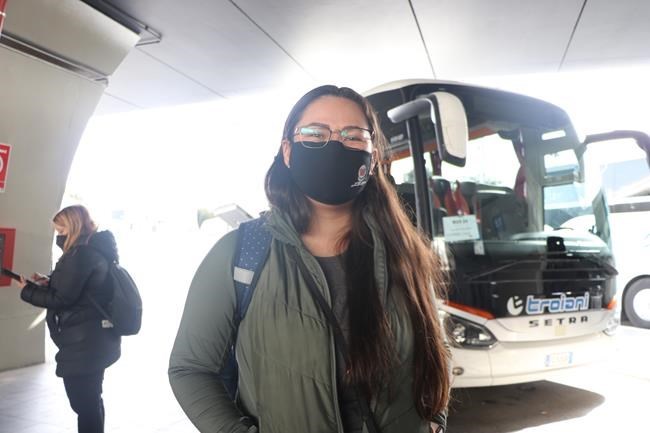ROME — An air of anticipation filled Indigenous delegates as their long flight from Montreal landed in Rome early Sunday morning ahead of planned meetings with Pope Francis.
"We are here because of our family, our family that has been uprooted, displaced and also relocated," said Chief Gerald Antoine, the Assembly of First Nations delegation lead.
"It's been a long journey. Finally, we are coming here to bring their message here."
The 32 Indigenous delegates may have different expectations heading into their upcoming meetings with the head of the Roman Catholic Church, but it's clear they all feel it is an important moment in history.
Antoine said sitting with friends, family, survivors and youth during the long journey from different parts of Canada to Italy provided support and unity.
"It was really good to see each other again and talk about our own anticipation for the trip," Antoine said.
Metis delegates will be the first to sit down with Pope Francis on Monday morning, followed by Inuit delegates later in the afternoon.
First Nations delegates will meet with the pontiff on Thursday. All three groups of delegates will then gather with the Pope on Friday for a much more public meeting that the Vatican expects to livestream on its website.
"I am excited I think ... to actually be here. It's like it just reassures you it's happening," said Taylor Behn-Tsakoza, a youth representative from British Columbia's Fort Nelson First Nation.
She said it feels momentous to actually be in Rome, especially since the delegation's original dates in December were delayed due to the COVID-19 pandemic.
Behn-Tsakoza said the conversations she's shared with survivors on the journey have left her humbled.
"It's their strength and their perseverance, the reason why we are here," she said.
About 170 people are taking part in the journey to the Vatican. Beyond the official delegates, there are family members and others to provide support. There are also staff for the Assembly of First Nations, Metis National Council and Inuit Tapiriit Kanatami.
The Canadian Conference of Catholic Bishops organized the delegation, and will have a handful of bishops attending.
The delegates split into two buses to make their way from the airport to the hotel where they were set to spend most of Sunday resting and preparing for the week's meetings.
In one bus, with Antoine as a passenger, the driver pointed out landmarks and historical buildings on the route. When the bus turned onto a road named for Christopher Columbus, the driver called him a "great Italian man."
It spurred a round of boos in the bus along with laughter as the Indigenous delegates acknowledged they were not the right crowd for celebrations of the Italian explorer.
During the week delegates will also get to visit the Vatican's museums, see collections of Indigenous art, and tour Assisi, the birthplace of St Francis, one of Italy's most famous patron saints.
The theme of the delegation is Walking Together Toward Healing and Reconciliation. Each Indigenous group will get a private hour-long meeting with the Pope. They have all expressed different intentions of what they will do with that time.
But they have all shared their expectation that Francis will commit to apologizing for the Catholic Church's role in residential schools. The Vatican, for its part, has said the Pope is open to a visit to Canada.
This report by The Canadian Press was first published March 27, 2022.
Kelly Geraldine Malone, The Canadian Press




